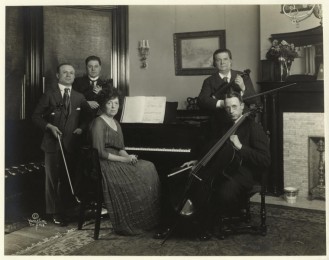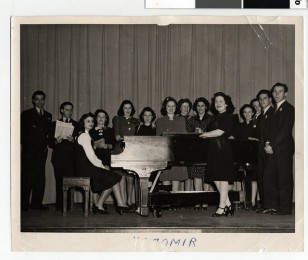Investing in human capital for innovation are buzz words. Politicians love them. They use them willingly and with palpable smugness, but it is hard to understand quite what they mean when they do. Obviously, it involves spending money, EU money, possibly even on training programmes advertised to make participants more flexible, productive, even innovative. But what are they actually trying to achieve?
Most training programmes have little long term value, simply because people do not learn to change the habits of a life time through the short immersion method. Would anyone be expected to play tennis to any standard after a two day training programme? Of course not. Why, then, do politicians and some business leaders pretend that they can change long established working practises and attitudes by “investing in human capital” rather than addressing the source of the problem? There is a double deception which needs to be addressed.
 photo: William P. Gottlieb, flickr, public domain
photo: William P. Gottlieb, flickr, public domain
In early June the Polish Chamber of Commerce, Krajowa Izba Gospodarcza, organised its second innovation congress. Two days were spent discussing innovation: the concept of innovation and the urgent need for innovation. The great and good of the nation from the President of the Republic to the youngest entrepreneur all said their bit about innovation….. Yes, we must develop innovation but, even so, we are not doing badly, not badly at all (if only we really knew what “innovation” means!). It was only when Prof. Michal Kleiber, President of the Polish Academy of Science, the penultimate speaker of the final session took the stand that the audience became noticeably uncomfortable. He pointed the finger of blame, and the academics and politicians didn’t like it. The implication must surely be that there is too much paternalism and protectionism within academic circles and politicans` calls for reform are not sincere.
Obviously, every country, not only Poland, must modernise and innovate if it is to survive in the world. However, the Polish education system, with rare and notable exceptions from primary school to university, remains solidly in the 19th century, with the emphasis on fact cramming rather than the exploration and implementation of ideas. Charles Dickens’ Mr. Gradgrind, the well-meaning but intelligence crushing schoolmaster in Hard Times is still to be found alive and prospering in classrooms across Poland. There is not much space allowed for thought and innovation under the tyranny of tests and exams. Worse still, very, very few schools have any sort of arts education (or well organised team sports, for that matter.) 93% of Polish children probably never have any meaningful practical experience of music making at any time throughout their school careers. The consequences are tragic for the individual child and far reaching for the economic prosperity and political stability of the country. Answers must be found and found quickly.
Music and theatre, art and literature are the greatest tools we have for developing the imagination. Small children entertain themselves spontaneously by singing to themselves, telling stories to themselves and moving to music. Yet, the education system ignores these natural instincts and even destroys the interest. The situation has become so bad that many young parents do not even know how or what to sing to their nursing babies. Since time immemorial mothers have communicated with their babies through song. Babies have developed language skills though song. The causes of this loss are easy to explain. Music making and singing in particular have been marginalised by passive listening which began with the invention of the radio. Schools used to provide some balance through singing. Now that this has gone few people have any experience at all of singing.
 photo: Young & Carl, flickr, public domain
photo: Young & Carl, flickr, public domain
The Arts exist for our moral and spiritual benefit. They should be used throughout the education of the young to develop their imaginations, self confidence and their ability to work with other people for a shared objective. The arts are not only for an elite that likes to dress up for concerts and theatre and who send their children to the “exclusive” music schools.
Poles are brilliant at passing exams, exams which usually test received knowledge, not the implementation of knowledge or original thoughts and ideas. This is fine as far as it goes, but education is not only about ticking boxes with the correct answers however good that looks in reports about the state of education in Poland. Education is about asking why and why again and finding different solutions. A system that does not encourage and enable children to develop their inquisitiveness and their imaginations and their self-confidence like muscles in a gym is dramatically hindering the young from reaching their potential. Where are the tools that do this in the Polish education system? There are none.
In The Merchant of Venice, Shakespeare reminds us of the importance of music:
The man that hath no music in himself,
Nor is not moved with concord of sweet sounds,
Is fit for treasons, stratagems and spoils;
The motions of his spirit are dull as night
And his affections dark as Erebus:
Let no such man be trusted.
It is a dire and stark warning and one that has probably not penetrated the corridors of Government or the many state-funded organisations that exist to promote music. Yet, a recent survey showed that Poles are amongst the least trusting nations on earth. 9 out of 10 Poles do not trust other Poles. Could this be a consequence of the lack of music? I think the lack of trust is profoundly important. It is the biggest handicap to the development of a civil society and a great impediment to business. It is a point that Prof. Rybiński made most forcefully in the innovation conference.
 Music lesson in 1957,
Music lesson in 1957,
Dutch National Archive,
photo: J. van Eijk, flickr, public domainResearch worldwide has shown that children who have a constant contact with music and the opportunity to make music in groups tend to develop intelligence and life skills more successfully than those who do not. Music has many hidden benefits. For example, most people have probably seen photographs of Albert Einstein sitting at his piano working out mathematical problems. Others will know from their own experience that making music with other people gives a great sense of achievement and togetherness.
The claim that music is good for you must be very hard to believe for most people in Poland. Their memories of music lessons in school are probably very negative. Learning about the lives of long dead composers or trying to play out-of-tune recorders is nobody’s idea of fun. Sadly, this is what music lessons still mean for most children who do not attend music schools. Music should be fun, it should be challenging and it should be done together. Music teaching should be based on singing, movement and storytelling: the three activities in which small children engage instinctively.
Whilst it is true that Poland spends money on music education, the example of the 300 or so state run music schools is not a good one. These unproductive, underfunded, unimaginative institutions should be closed down and incorporated into ordinary schools. Thus, every child would get the opportunity of some contact with instrumental music and, if they wanted to, the opportunity of learning to play. Instrumental music should be an optional extra for all children.
Things are happening at kindergarten level. Some primary schools have some proactive classes. Some individual teachers are trying to develop music and theatre activities. There are some expamples, according to the Ministry of Culture, where music has been introduced to general schools. However, the fact remains that the official and unofficial views of how music should be taught are unconvincing, to say the least.
 Music classes in Brooklyn,
Music classes in Brooklyn,
photo: Robbins, flickr, public domain
Usually, children from non-musical families are drawn to music by peer pressure or through chance encounters in school corridors or assembly halls. Well-meaning or ambitious parents should not be the only motivation for a child to take up music. By incorporating music into the everyday life of normal schools, music itself becomes normal as much as maths, history or biology. Thus, the education system becomes more balanced and, as a result, produces more rounded, more self-confident and more empowered adults ready and able to make a contribution to the lives of others. Developing balanced and empowered people should be the objective of any good government and education system.
The music schools certainly contribute very little to the music industry which, in Poland, hardly exists despite the high number of trained musicians the system produces. Young Polish musicians often have to go abroad to finish their training because the approach both to playing and marketing music is so narrow. Furthermore, very few teachers, whether in academies or music schools, attend teaching courses or maintain their own skills through having lessons themselves. This has serious consequences for the way they teach and, thus, the mentality and skill base of the students they train.
The Ministry of Culture is now responsible for music education in all schools. To keep themselves busy, the politicians and bureaucrats seem to be constantly engaged in re-writing programmes that can never been implemented. These programmes can never be implemented for one very simple reason: the Ministry has no authority to require the gmina, the local authorities, to introduce its programmes to their schools. It is the Gmina who pay.
Given some of the ideas going around the corridors of the Ministry, this failure may not be undesirable. However, through their inability to engage with the problem, the political classes and, thus, the education system, are failing the country. Perhaps they don’t care? The fact that only 1% of state money given for the 2010 Chopin Year was spent on education indicates how much importance the Ministry of Culture attaches to music education for the general public. That none of the Chopin capital education projects was either finished or funded for legacy activity is damning evidence. Quite simply, music does not matter in the Ministry of Culture. Then how can the Ministry be responsible for the musical education of the nation?
Nor is the Ministry the only problem. There is the problem of the availability of qualified, quality teachers and, even more dramatic, the policies of the National Opera and the National Philharmonic. These great institutions are unique in the whole of Europe in not having any effective educational and outreach programmes. They enjoy a self-imposed isolation from the people whom they exist to serve: the general public, not the chosen elite. This is a grave and scandalous failure on the part of these heavily state-subsidised bodies and one which their political paymasters seem happy to ignore.
What can be done to save the future? Is this a lose-lose situation? Not necessarily. The question is very simple: How can the gmina be encouraged to introduce music and the performing arts to their schools when no leadership or example is given by the great national institutions in the capital? Part of the problem, but only a part, is money. The rest is goodwill, imagination and organisation.
What is needed is a National Performing Arts Educational Centre for Schools: an inspiring flag-ship example, an education power house for the whole country. The Centre would have an outreach programme for training teachers to use performance skills in the classroom; a place where model programmes would be run with ordinary school children as an example for schools and other institutions throughout the country; a place where these skills could be developed not only for the classroom but also to help management and business develop skills essential for good business practice. Obviously, developing new teaching material will be a priority and musical theatre will be a key area for development.
 Hazomir Hanukkah choral movemenet, 1940
Hazomir Hanukkah choral movemenet, 1940
flickr, public domain
Why musical theatre? Because it has something for everyone: singing, dancing, acting, technical requirements and organisation. A musical theatre performance in a school enables children to work together for a shared objective and receive the all important recognition from their peers when they perform. A performance that is open to friends and parents puts the school at the heart of the community. Apart from school sports matches, when and where else is there space for this most important experience?
The initial funding should be for 5 years with a minimum annual budget of 500.000 PLN. This funding should come from private sources. Since business has a vested interest in young people, building links with business and education is highly desirable. It is a staggering fact that almost no adolescents get any form of careers advice before they leave secondary school or before they chose their higher education options. Most children are constrained to follow their parents` advice and study subjects that they perceive will offer a job for life rather than develop the mind. This might have worked 20 years ago. Today it is redundant thinking. We have enough lawyers. The Centre could build links between business and the young by developing visits to business sponsors and buddy programmes between individual employees and children.
Investing in human capital for innovation are buzz words. Businesses tell their staff that they are being given training because the company cares about them. Sometimes this is true. More often, companies are trying to give their staff the basic skills they should have learnt at school: team work, trust and the sharing and implementation of ideas. These are the skills they should have learnt through team sports and the performing arts.
The other deception is political. As far as the arts are concerned, Poland is still run like a Soviet state. There is little or no transparency or accountability for the allocation of public money which invariably goes into the pockets of the chosen few. There is even less confidence that the political and bureaucratic decision-makers are competent. How often can they be seen in concert halls or at performances? Rarely, if ever.
Poland must innovate but the culture of innovation cannot be created on a whim. The people in power, the politicians and the academics, must wake up to the awful reality and take responsibility. But they should not be expected to do everything. Parents and people who have an interest in the welfare of the country must bring pressure to bear for change. Poles deserve a better education system but the system cannot get better without music and the Arts as an equal partner in the syllabus. There must be an end to this cultural elitism. Innovate!










